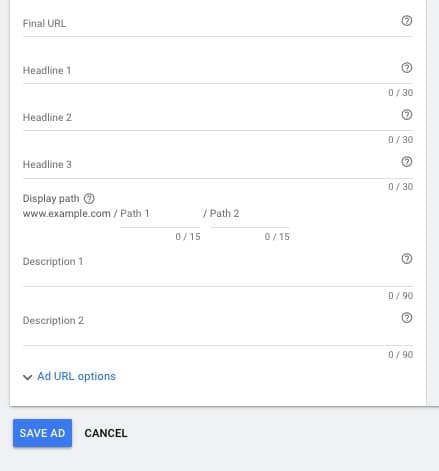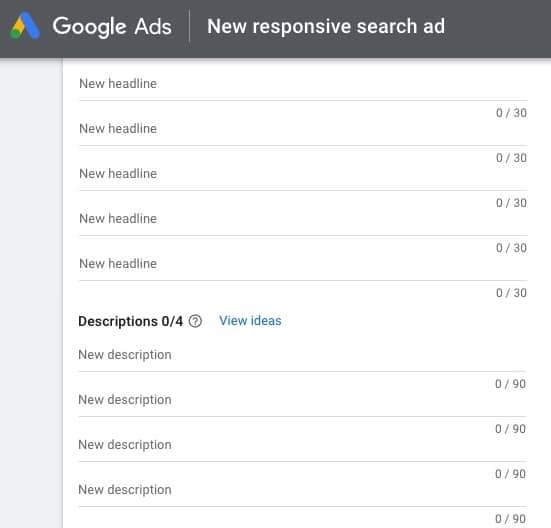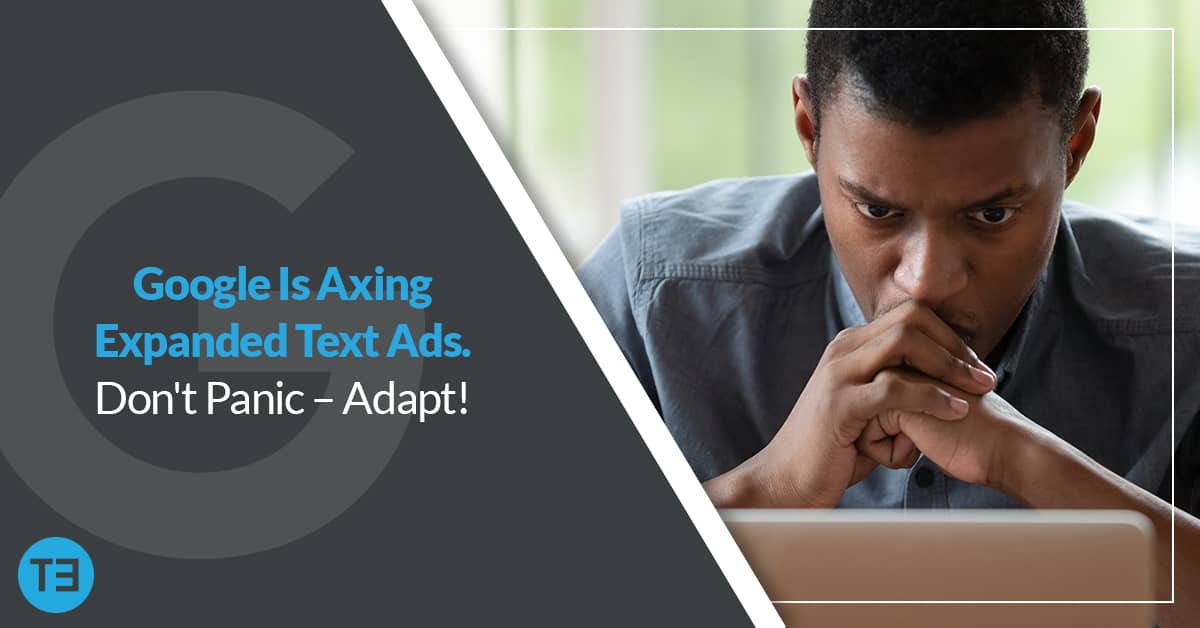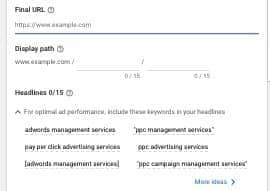What Does Google’s Expanded Text Ads Update Mean for You?
5 Minute Read
We saw it coming and now it’s official: Google has taken another big step toward making pay-per-click campaigns 100% automated. Starting June 30, 2022, Google Ads will no longer support the expanded text ads format that has been the bread and butter of search advertisers for years.
Beginning next year, responsive search ads will be the only standard ad option for PPC. This gives Google control of the ad copy delivered to consumers, rather than advertisers and businesses.
Retiring expanded search ads is just the latest in a string of moves by Google to automate search advertising campaigns. For some time now, Google has been pushing advertisers to use automated bidding models, broad-match keywords, and ads generated by crawling the business’s website. Keyword query data has also become more limited in Google Ads.
So, with all of the steps Google is taking to limit the role of advertisers in creating search ads, you may be wondering if you really need an agency to handle your campaigns. Although the thought of saving money and creating ads yourself based on Google’s recommendations may be tempting, there are still very good reasons to work with a proven PPC agency.
How Do Responsive Search Ads Work?

The format for responsive search ads is very similar to expanded text ads. Both types of ads display text from up to 3 headline fields (each limited to 30 characters) and up to 2 description fields (each limited to 90 characters).
With expanded text ads, advertisers have to input the text they want to use for each headline and description. With responsive search ads, advertisers create a list of headlines (up to 15) and descriptions (up to 4). Using machine learning, “Google Ads assembles the text into multiple ad combinations” with the goal of creating ads that align with the keywords and phrases consumers search.
Google Ads may employ a number of different combinations to find the ad that best serves the audience. However, advertisers have the option to pin one headline and one description to ensure consumers see certain text in every iteration of an ad.
Reporting on responsive search ads is done as a whole. This means that advertisers only have data for the entire campaign, with no ability to see which ad combinations are working the best.
What Do Responsive Search Ads Mean for Your Advertising?

According to Google, the reliance on machine learning instead of choices made by the advertiser is a means of capitalizing on the ever-changing online search landscape. Internal data from Google reveals that 15% of search terms every day have never been searched before, and automation is key for allowing businesses to keep up with novel forms of consumer intent.
Many advertisers are understandably nervous about the move to sunset expanded search ads. In addition to more limited control over the ads consumers see, one of the biggest concerns is the variability in performance. Some advertisers see a higher percentage of conversions with responsive search ads, while others see campaigns with lower conversions.
Businesses that hire an agency to handle pay-per-click advertising may wonder whether it makes sense to continue paying a partner. After all, Google is organizing the ad copy, and the Google Ads platform provides a number of recommendations for enhancing performance – right?
In reality, businesses that try to go it alone in the coming era of responsive search ads supremacy could run into a number of obstacles:
- The use of machine learning will make in-depth keyword research essential to compete – this is often beyond the time, resources, and budget available to small businesses
- Businesses with small budgets for PPC advertising could struggle to see a return on investment when automation makes decisions about how to deliver your ads with limited data
- Competitive verticals (such as legal, insurance, etc.) will remain difficult to crack, as the algorithms for paid search will continually update and could result in drastic changes for campaigns targeting high-volume searches
- Limited reporting from Google Ads makes it difficult to A/B test and perform adjustments to improve an underperforming campaign
- If success was based on simply following all of Google’s recommendations, everyone would succeed; the suggestions on Google Ads are not specific to any one business or industry
Given these challenges, working with a knowledgeable digital advertising agency is still essential for your success.
How an Agency Can Help with Responsive Search Ads
Until now, the majority of advertisers have focused on running expanded text ad campaigns. In addition to keyword research, strong copywriting has been a major aspect of creating ads that speak to consumers and drive conversions.
The importance of strong copywriting has not dwindled with the shift to responsive search ads. However, what it takes to be effective has changed.
Instead of writing headlines and descriptions for internal consistency, advertisers and copywriters need to focus on copy that can work across many different versions. This requires consistency not only in style (i.e., making sure capitalization, punctuation, and tone are the same no matter how a responsive ad is served) but in the use of keywords. You won’t be able to see which version of the ads performs the best, so responsive search ads demand a more thoughtful, cohesive approach upfront.
Along with knowing Google Ads inside and out, perhaps the most important thing to look for in a PPC advertising partner is extensive knowledge of the type of customers who buy your products and/or invest in your services.
If the agency doesn’t know your audience, your keyword research, audience segmentation, and copywriting will all suffer and your ads will likely underperform as well. When an agency knows your industry and the customers you serve, on the other hand, this should result in more effective campaigns and higher conversions.
And, although you’re working in the paid advertising space, an in-depth knowledge of SEO is also essential.
Your agency must know how search engines work in the context of both paid and organic search. This understanding will allow for the identification of valuable keywords that align with your customers, as well as the creation of ads that will be recognized by Google Ads algorithms as serving customers better than the competition.
Get Help with Your Google Ads Campaigns
In 9 months, the primary option advertisers have used for PPC ads will be no more. Don’t panic – Adapt.
With change on the horizon, now is the time to start working with your agency to determine the best solution for developing responsive search ads that reach your customers, drive conversions, and boost your revenue.
As a Google Partner, Twelve Three Media has intimate knowledge of the Google Ads platform. Our agency has weathered a number of significant changes in paid search marketing, emerging stronger and wiser each time and helping our clients achieve greater success.
The migration to responsive search ads does take some choice away from advertisers and businesses. However, the change also signals the value Google Ads places on campaigns that know customers and their search behaviors, as well as the messaging that makes them convert.
Get the unfair marketing advantage. Contact the Pay-Per-Click Management Team at Twelve Three Media to learn how we can help you maximize conversions from your search ads!

